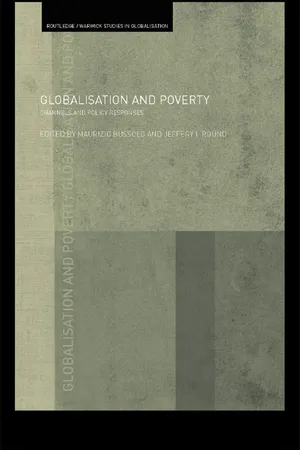
- 238 pages
- English
- ePUB (mobile friendly)
- Available on iOS & Android
Globalisation and Poverty
About this book
The consequences of globalization for the world's poor are uncertain and fierce rhetoric is dividing its supporters and detractors.
The channels of effect of essentially macroeconomic shocks on the microeconomic position of individuals and households in poor countries are many and various. This book addresses three core issues: 1) what are the main channels of effect? 2) what are the lessons to be learned from policy measures to alleviate negative poverty consequences? and 3) do the proposed analytical approaches assist in providing a monitoring capability?
This volume assesses the more easily quantifiable effects resulting from price and quantity responses in the goods and labour markets. It includes studies of Colombia, Ghana, India, Nepal, Bangladesh and Vietnam. It uses key analytical approaches, most of which are based on numerical simulation methods employing models with different levels of complexity. These models capture the features of an economy, how it functions, and how it might respond to globalization shocks. The most important collective contribution of the authors is their establishment of directions and magnitudes of effect, based on empirical evidence.
Tools to learn more effectively

Saving Books

Keyword Search

Annotating Text

Listen to it instead
Information
8 Globalisation and poverty changes in Colombia
Maurizio Bussolo and Jann Lay
Introduction
Table of contents
- Cover Page
- Routledge/Warwick Studies in Globalisation
- Title Page
- Copyright Page
- Tables
- Figures
- Notes on contributors
- Acknowledgements
- Foreword
- Introduction
- A simple methodology with extensions
- 2 Linking trade liberalisation and poverty: An illustration from vietnam in the 1990s
- 3 Globalisation and poverty: Implications of South Asian experience for the wider debate
- 4 Globalisation in developing countries: The role of transaction costs in explaining economic performance in India
- 5 Globalisation–poverty interactions in Bangladesh
- 6 Poverty and policy in a globalising economy: The case of Ghana
- 7 Trade liberalisation and poverty in Nepal: A computable general equilibrium micro-simulation analysis
- 8 Globalisation and poverty changes in Colombia
Frequently asked questions
- Essential is ideal for learners and professionals who enjoy exploring a wide range of subjects. Access the Essential Library with 800,000+ trusted titles and best-sellers across business, personal growth, and the humanities. Includes unlimited reading time and Standard Read Aloud voice.
- Complete: Perfect for advanced learners and researchers needing full, unrestricted access. Unlock 1.4M+ books across hundreds of subjects, including academic and specialized titles. The Complete Plan also includes advanced features like Premium Read Aloud and Research Assistant.
Please note we cannot support devices running on iOS 13 and Android 7 or earlier. Learn more about using the app